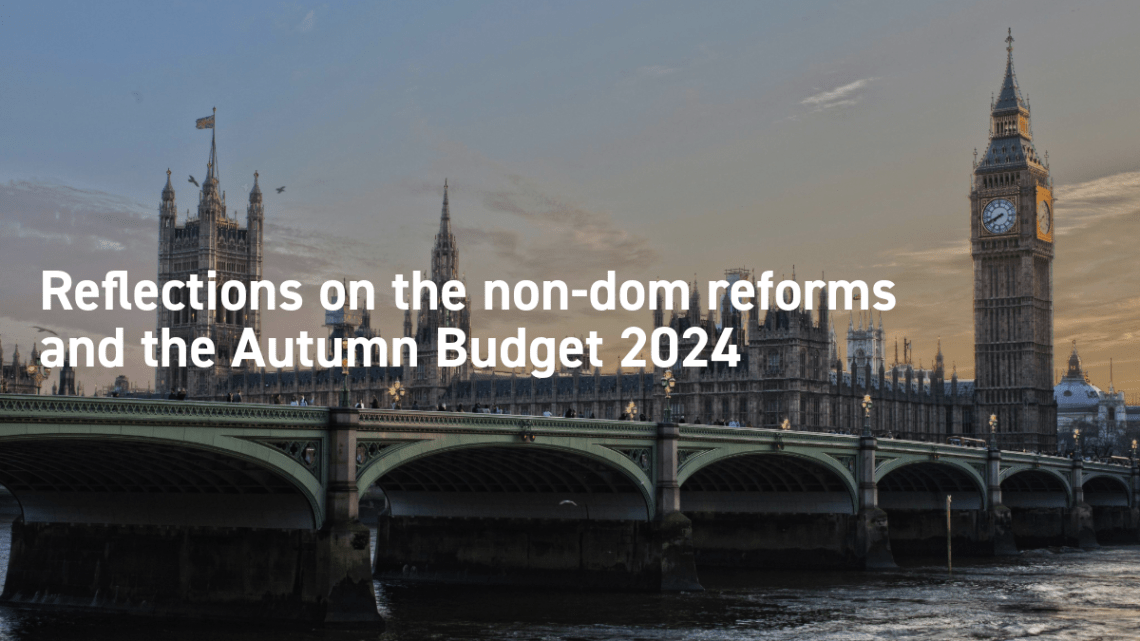
This article was first published on FT Adviser.
The non-dom reforms have been the subject of much speculation and debate since they were first announced in the Spring Budget by the then Chancellor Jeremy Hunt. One of the fundamental questions at stake is whether the Government should prioritise fairness in the tax system over encouraging wealthy individuals to live and invest in the UK.
At present, non-doms – who, in very broad terms, are individuals whose permanent home is outside the UK – are able to access certain UK tax advantages. These include: being able to shelter their foreign income and capital gains from UK tax provided they do not remit them to the UK; and, not paying Inheritance Tax (IHT) on their non-UK assets provided they are not linked to UK residential property.
Although these rules have sometimes been referred to as loopholes, in reality they have intentionally been included within the UK’s tax code for some time. A number of other countries such as Italy and Portugal have established similar regimes to attract high net worth individuals to move there.
In recent years, the tax advantages for non-doms have eroded away. For example, when a non-dom has been UK resident for 15 out of the last 20 years they are now deemed to be UK domiciled anyway. However, it is the removal of some of the remaining benefits – particularly those in relation to IHT – that are causing the most controversy.
As of Wednesday’s Budget announcements, we now have some more clarity over the new rules, which the Government still intend to implement from 6 April 2025.
The key reforms can be briefly summarised as follows:
Those who were expecting a watering down of these rules – as suggested by a Government official in September – have been left largely disappointed.
There are some practical benefits to the proposed reforms. Whilst the intricacies of determining an individual’s domicile made for an interesting intellectual exercise for tax advisers, it often left people in a state of uncertainty about whether HMRC would accept their domicile status in a particular jurisdiction. Residence, on the other hand, is generally more clear-cut, making a move to a residence-based system a welcome simplification of the tax system.
In addition, not many advisers will miss the highly complex rules on when foreign income and gains are remitted to the UK as they sought to protect their clients’ wealth by keeping it overseas. Indeed, the new regime aims to remove this barrier to bringing money into the UK which exists under the current rules.
However, there are concerns that the new regime will not be suitably competitive to attract high net worth individuals to the UK (because the 4-year exemption is not long enough to provide an incentive to move here) or prevent others from leaving.
The main driver that is leading some non-doms to leave the UK is the changes to the IHT position. This is partly due to the UK’s relatively high rate of IHT, but also because many non-doms will have arranged their affairs under older or existing rules to protect against their IHT liability, only for those protections to be removed when they are much older and therefore less able to plan ahead for their death.
Several trusts were created by non-doms for the IHT protections they offered. Due to the complex web of overseas trust tax rules, it may be prohibitively expensive to unwind many of these structures such that the beneficiaries will be unable to get themselves back to a position where the trust assets are held in personal names again. An option that is still available to the Government is to provide a transitional period under which trusts can be dismantled without incurring heavy UK tax charges.
Whether these reforms make or cost the Chancellor money may never be known due to the myriad of matters that are difficult to measure. Ultimately, though, despite its importance to the UK tax code, the non-dom regime and its residence-based replacement will not be the only factor that determines the Government’s ability to encourage investment into the UK to contribute towards their economic growth ambitions.
If you have any queries then please get in touch with Sam Dewes.
We’d love to hear from you. To book an appointment or to find out more about our services: